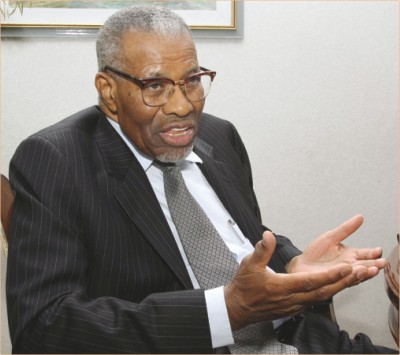Islamic banking on a roll - IDB chief shares his views on Islamic finance with The Daily Star

Ahmad Mohamed Ali - IDB Chief
Bangladesh's commercial banks following Shariah-based principles will continue their phenomenal growth as elsewhere in the world as the system deals with 'real economy and real commodity', the head of Islamic Development Bank (IDB) Group said.
In Bangladesh, there are now seven Islamic banks that provide full-fledged Shariah-based financial services through 622 branches. Besides, a number of conventional banks have set up branches to grab a pie of the market.
“The IDB is a shareholder of Islami Bank Bangladesh, the largest Islamic bank in the country. It is doing very well. Buoyed by its success, Bangladesh has now a number of Islamic banks,” said Ahmad Mohamed Ali, president of Jeddah-based IDB.
“A number of commercial banks have also opened wings for Islamic banking. It is growing and we expect the growth will continue in future,” he told The Daily Star on Monday in an interview.
He said the Islamic banks in Bangladesh are growing faster with high profit margin, due to the preference of people. “This is the choice of the people.”
“There is an indication that they expect to earn more,” he said, when asked about the reason why many commercial banks are opening Islamic banking wings or totally converting to Shariah-based banking.
Ali said the growth of Islamic banking in Bangladesh is part of the phenomenal growth of Shariah-based financial system across the world, particularly after the global financial crisis.
He said Islamic banking is spreading across the world, not only in the Muslim countries, but also in the non-Muslim countries.
“Islamic banks have proved more resilient to the crisis. There is a demand for it, especially after the financial crisis in countries such as England, France and Italy,” he said.
Although the head of the development bank could not give an exact estimation of the growth of Islamic banking, he said: “Many experts and observers say Islamic banking is a fast-growing industry. Some of them put the annual growth at 15 percent and higher.”
“The industry will definitely grow more and more in the future.”
He said, when the IDB was established in 1975, there was only one Islamic bank in the world. “Now, there are hundreds of such banks managing billions of dollars.”
There are Islamic banks in 40 countries, and those are handling business worth $22 trillion, according to analysts. In Bangladesh, private banks control about 62 percent of the economy, and Islamic banks account for a significant part of that.
During the global financial crisis, a number of big banks in the developed world collapsed and had to be bailed out by taxpayers' money, while banks complying with Shariah principles continued outstanding growth.
“The reason is very simple: Islamic banking deals with real economy. There is no speculation,” he said.
In Bangladesh, critics have serious misperception and doubt about the religion-based banking system, but Ali defended, saying: “There are Shariah committees; the central bank audits them regularly and they publish their accounts. So I don't understand why there should be any misperception.”
Ali said he does not think there is any need for a separate regulatory system to police Islamic banking. “In my opinion, Islamic banks should be regulated by the normal authorities. But there are some necessities of the Islamic banking that should be taken into consideration by the central bank.”
He said, for every Islamic financial institution there is a Shariah board to ensure that the operations of that institution are in accordance with Islamic principles.
Critics say Islamic banks cash in on people's sentiment -- a thing Ali has not denied completely. “In any business, you have to market it and cash in on the sentiment or the feelings of the customers.”
“You need to use all ways and means to convince the potential customers to come and buy your products.”
He said Islamic banks respond to the demand from individuals either because of their belief or nature of the business. There are some businesses that are appropriate for the market.
“In Malaysia, for example, there are Chinese businessmen who are dealing with Islamic banks although they are not Muslims. They found Islamic banking as more appropriate for their business.”
This week Ali was in Dhaka to facilitate signing of an agreement to finance shelter, water supply and sanitation projects in the cyclone Sidr-affected areas under IDB's $130 million philanthropic “Fael Khair” programme.
The donation was made to the bank by an anonymous philanthropist to support the victims of cyclone Sidr, which hit the coastal areas of Bangladesh in 2007, killing thousands and rendering millions homeless.
On Monday, Ali, the former deputy education minister of Saudi Arabia, visited Sidr-affected Sharankhola upazila in Bagerhat to lay the foundation stone of a school-cum cyclone shelter.
Of the total grant, $110 million will be spent for constructing about 440 cyclone shelters-cum-primary schools. Each building, equipped with solar energy, will be used as schools in the normal time and as shelters during any natural disaster.
The IDB is providing $140 million to the government to help construct the much-talked Padma Multipurpose Bridge.
“This is the largest participation of the development bank in any single project in Bangladesh,” he said.
- By
Source: The Daily Star/Bangladesh/May-25-2011
Other Posts
- Intraco Group New Partner For SCB Credit Card’s InstaBuys At 0pc
- Premier Bank vows to be a 'Bank of Choice' for all clients
- Jamuna Bank Limited Approves 22 Percent Stock Dividend
- Govt, Islamic Development Bank (IDB) sign $140m loan deal on Padma Bridge
- IDB selects four NGOs for philanthropic programme
- BB chief urges Islamic banks to avoid terror financing
- Asian Development Bank (ADB) pledges to provide $3.715b in 4 yrs
- Rupali Bank approves 10 pc stock dividend




Comments